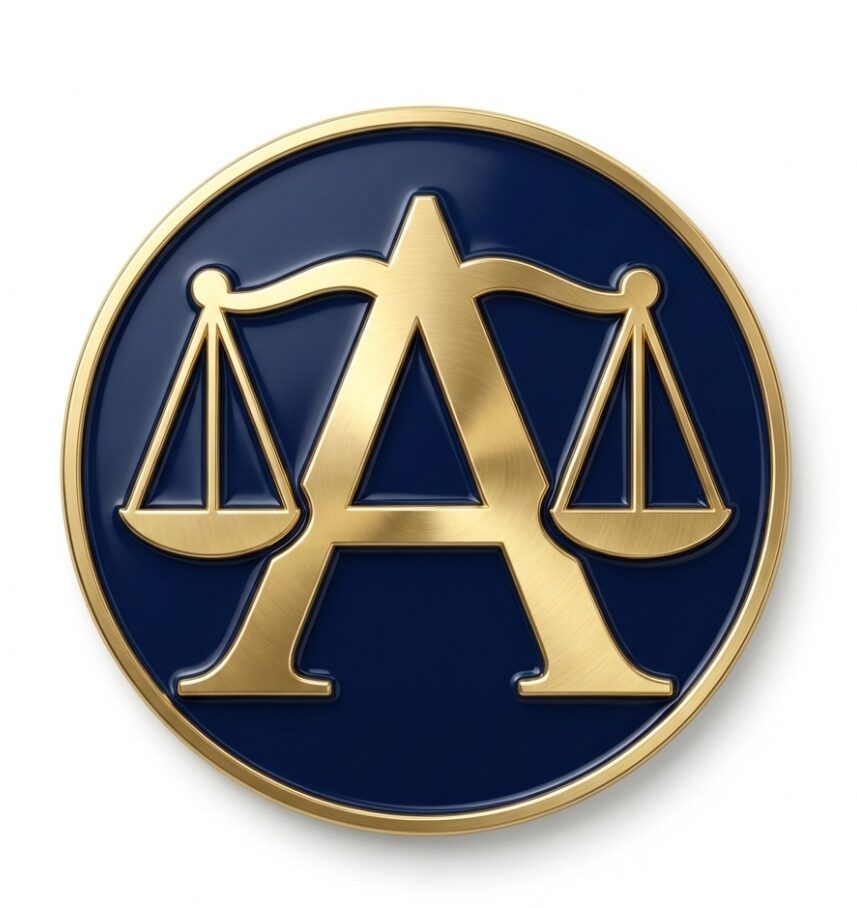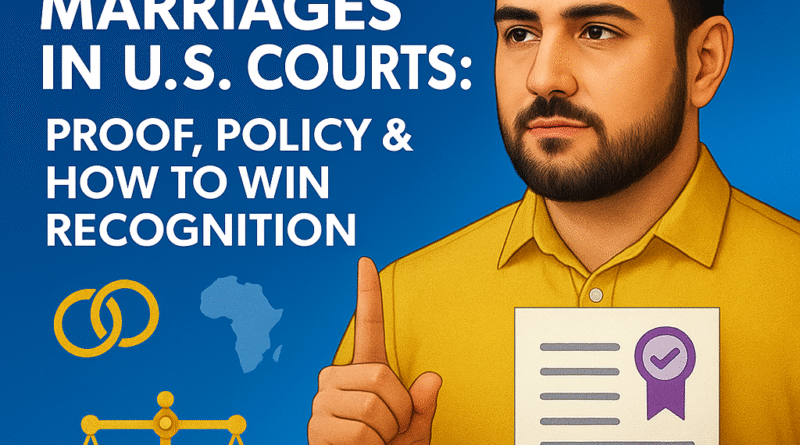Customary African Marriages in U.S. Courts: Proof, Policy & How to Win Recognition
Scope and why this matters
U.S. courts and agencies routinely face questions about marriages formed under customary African law—for immigration, probate, wrongful-death standing, inheritance, equitable distribution, and benefits eligibility. Because many customary marriages are valid where celebrated yet not always recorded in Western-style registries, the central issue in U.S. proceedings is usually the evidentiary burden: what proof establishes that a customary marriage existed and is recognized for the requested purpose, and what public-policy limits (e.g., polygamy, age, consent) apply in the forum?
Quick Guide (English)
- Rule of thumb: A marriage valid under the law of the place of celebration is generally recognized in the U.S., subject to public-policy limits (e.g., polygamy, prohibited degrees, age).
- Burden of proof: civil standard (preponderance of the evidence) unless a statute says otherwise. Provide foreign-law proof and fact proof of the ceremony/practice.
- Prove foreign law using expert declarations, statutes/regulations, scholarly sources, or judicial notice mechanisms; attach English translations.
- Prove facts using registry extracts (if any), affidavits of elders/witnesses, lobola/bridewealth receipts, photographs, church or community records, cohabitation evidence, and children’s birth registrations naming both spouses.
- Authenticate public documents via apostille (Hague) or consular legalization; translate every stamp with a certified/sworn translator.
- Red flags: polygynous unions, parties under local or forum age limits, lack of consent, or “proxy/telephonic” celebrations that conflict with forum policy.
- Strategy: submit a two-layered packet: (1) the law that makes the union valid; (2) the evidence that this couple complied with that law.
What is a “customary African marriage” for evidence purposes?
Across African jurisdictions, customary marriage refers to a union formed according to the customs of a community or ethnic group. Core elements often include: negotiation and consent of the families, consent of the parties, payment/acknowledgment of bridewealth (e.g., lobola) or symbolic consideration, a celebration/handing-over rite before elders, and subsequent cohabitation and reputation as spouses. Many countries have modern statutes recognizing or codifying these unions (e.g., South Africa’s Recognition of Customary Marriages Act; Kenya’s Marriage Act; Ghana’s Customary Marriage and Divorce (Registration) Law), sometimes allowing or requiring registration but not always making registration a condition of validity. The exact elements and optional registration rules vary, which is why U.S. tribunals require clear foreign-law proof.
U.S. recognition framework
- Place-of-celebration rule: If a marriage is valid under the law where it was celebrated, U.S. courts ordinarily recognize it (comity), unless it violates a strong forum public policy (e.g., polygamy).
- Forum law governs evidence and policy limits: Authentication, hearsay exceptions, and expert-law procedures are controlled by the forum’s evidence rules (e.g., Federal Rules of Evidence), while capacity/consent thresholds may be tested against both foreign law and forum policy.
- Immigration parallel: USCIS/State Department typically honor marriages valid where celebrated under a preponderance standard; polygamous unions are not recognized for immigration benefits.
- Limited vs. full recognition: Even when a union conflicts with policy (e.g., polygamy), some forums may recognize it for limited purposes (e.g., child legitimacy, wrongful-death standing) while denying full spousal benefits. This is fact- and forum-specific.
Evidentiary burdens: what you must prove
1) The content of foreign law (validity elements)
Show the legal test for a customary marriage in the country/community of celebration. In U.S. courts, foreign law may be proved by expert testimony, treatises/statutes, and judicial notice mechanisms (e.g., Fed. R. Civ. P. 44.1 in federal practice; state analogues). Provide certified translations of statutes or official guidelines; include expert credentials and a clear, element-by-element summary (e.g., “consent + bridewealth negotiation + ceremony + cohabitation”).
2) The facts that this couple satisfied those elements
Offer first-hand witnesses (elders, officiants, family heads), documents (customary marriage certificates/registration extracts where available), receipts for bridewealth, photos/videos of the rite, and community reputation evidence (church/mosque registers, village records). Corroborate with post-marriage conduct: joint residence, joint children’s birth registrations, tax/benefit filings, and consistent identity documents.
Evidence map: categories, examples, and probative weight
| Category | Examples | Typical probative value | Authentication/notes |
|---|---|---|---|
| Official registry record | Customary marriage certificate; municipal register extract; gazette notice; court registration | High (prima facie validity) | Apostille/legalization + certified translation |
| Religious/community records | Church/mosque book; elders’ minutes; village certificate | Medium–High (if recognized channel in that community) | Lay foundation; translate stamps; consider hearsay exceptions for family/religious records |
| Witness testimony | Elders/parents/officiants; participants in bridewealth negotiations | Medium (rises with detail/consistency) | Affidavits + live testimony; explain roles/custom |
| Artifacts from the rite | Receipts for lobola/bridewealth; lists of items; photographs; videos | Medium (corroborative) | Date/source metadata; identify participants/locale |
| Post-marriage conduct | Cohabitation leases; joint bank/benefit forms; children’s birth certificates naming both parents | Medium–High (marriage by repute supports validity) | Prefer official records with authentication |
| Expert on foreign/customary law | Professor/practitioner with community/field expertise | High for legal elements; Medium for applied facts | Provide CV, publications, methodology; attach sources |
“Graphic” info — risk matrix for acceptance
| Risk factor | Low | Medium | High | Mitigation |
|---|---|---|---|---|
| Documentary backbone | Official registration/gazette + apostille | Community records + affidavits | Only oral testimony | Seek retro-registration; add expert report; enhance corroboration |
| Public-policy conflict | Monogamous; age/consent satisfied | Ambiguous age/consent evidence | Polygynous or forced marriage indicators | Limit the relief sought; use alternative standing doctrines |
| Translation/authentication | Certified/sworn translations; apostille/consular chain intact | Minor omissions in stamps/backs | Untranslated/unauthenticated exhibits | Re-translate fully; fix chain; explain gaps |
| Witness quality | Elders/officiants with specific detail | Family members with partial knowledge | Hearsay-only statements | Add neutral community witnesses; bolster with artifacts |
Public-policy limits and how courts handle them
- Polygamy: U.S. jurisdictions generally refuse recognition of polygamous marriages for most purposes. Some courts, however, allow limited recognition (e.g., inheritance or wrongful-death dependency) to avoid unjust enrichment; immigration will not treat a polygamous spouse as a “spouse” for benefit eligibility.
- Age and consent: If the foreign law permitted marriage below the forum’s minimum age or without genuine consent, recognition can be denied. Evidence of free and informed consent is critical.
- Same-sex unions: After Obergefell, U.S. law recognizes same-sex marriages valid where celebrated, but most customary-law systems historically did not form same-sex marriages. This mismatch rarely arises but is conceptually relevant.
- Proxy/remote ceremonies: Some customary rites involve representative negotiations; forums may scrutinize whether there was personal consent and later cohabitation/ratification.
Practical packet for court or agency
- Foreign-law proof: statute excerpts, government guidance, treatises; expert declaration with credentials and an element-by-element opinion.
- Event proof: registration extract (if any) or community/religious records; elders’ minutes; bridewealth documentation; photographs/videos; witness affidavits identifying the rite, date, location, and roles.
- Post-marriage conduct: cohabitation records, joint financial documents, children’s birth registrations naming both spouses.
- Formalities for U.S. filing: apostille/consular legalization on public documents; certified/sworn translations that include every stamp and margin note.
- Policy screen: explicit statement that the marriage is monogamous, involved adult parties with full consent, and does not contravene forum policy.
Where do these cases arise? (decision table)
| Forum | Typical goal | Key proof | Special cautions |
|---|---|---|---|
| USCIS / Immigration Court | Spousal petitions; derivative benefits | Validity where celebrated + bona fide relationship; preponderance | No recognition of polygamy; consistency across filings |
| State family court | Divorce/maintenance; custody; protective orders | Proof of valid marriage for jurisdiction; foreign-law expert | Public-policy screen; interim relief even if validity disputed |
| Probate / wrongful death | Spousal standing; intestacy share | Customary law validity + cohabitation reputation evidence | Courts sometimes allow limited recognition to prevent injustice |
| Benefits/insurance | Spousal coverage; survivor benefits | Official documents + translations; plan definitions | ERISA/plan terms may define “spouse” narrowly |
State-law wrinkles and equitable fallbacks
- Common-law marriage states (a shrinking minority) may accept proof of mutual agreement + cohabitation + reputation if the couple later lived there. Do not conflate this with customary marriage; use as an alternative theory only if elements are met.
- Putative-spouse doctrines (some states) may protect a good-faith spouse whose marriage is later found invalid (e.g., polygamy or defective ceremony), allowing equitable relief like maintenance or property division.
- Declaratory actions: When agencies refuse benefits for lack of “proof,” seek a declaratory judgment on marital status with full evidentiary record.
Frequently Asked Questions (English)
1) Is a customary African marriage automatically valid in the U.S.?
No. You must show it is valid where celebrated and does not violate forum public policy. Provide proof of foreign law and facts of compliance.
2) What is the evidentiary standard?
Preponderance of the evidence in most civil contexts (including immigration), unless a specific statute imposes more.
3) We do not have a certificate—what else can we submit?
Affidavits from elders/officiants, receipts/lists for bridewealth, photos of the rite, community/church registers, cohabitation documents, and children’s birth registrations, plus a foreign-law expert explaining why those items satisfy the elements.
4) Do we need an apostille?
For foreign public documents used in U.S. courts, yes if both countries are Hague members; otherwise provide consular legalization. Translations should be certified/sworn.
5) How do we prove the content of foreign customary law?
File expert declarations attaching statutes, official circulars, and scholarly commentary; use the forum’s foreign-law procedure (e.g., federal Rule 44.1) to aid judicial notice.
6) Will U.S. courts recognize a polygynous customary marriage?
Generally no for full marital rights; some courts allow limited recognition for equitable reasons (e.g., dependency). Immigration law will not treat a polygamous union as a qualifying marriage.
7) Our witnesses live abroad—must they appear live?
Not always. Use sworn affidavits, depositions, or live video per court rules. Provide translations and identity documents for witnesses.
Further reading:
8) The celebration was partially religious; is that a problem?
Not if the customary law treats that rite as satisfying marital elements. Provide expert support and any religious register entries.
9) Can we retro-register the marriage at home to strengthen the case?
In some countries, yes. Retro-registration can provide a strong official record; explain timing in your declarations.
10) Which documents must be translated?
Translate everything you file—including stamps and backs—using a certified/sworn translator. Attach the translator’s certificate of accuracy.
Technical-legal foundation (English, plain language)
- Place-of-celebration & comity: U.S. recognition generally follows validity under the law where celebrated, subject to public-policy exceptions (Restatement-style conflicts analysis widely used).
- Standard of proof: Civil preponderance standard in most contexts, including immigration adjudications.
- Foreign-law proof: Federal Rule of Civil Procedure 44.1 (and state analogues) allow courts to consider any relevant material to determine foreign law, including expert testimony and treatises.
- Authentication: Federal Rules of Evidence 902(3) (foreign public documents) and the Hague Apostille Convention provide mechanisms for self-authentication; non-Hague routes use consular legalization.
- Hearsay exceptions: Records of religious organizations and family records can fit FRE 803(11) and 803(13) in appropriate circumstances; courts retain discretion on trustworthiness.
- Illustrative foreign statutes (not exhaustive): Recognition of Customary Marriages Act (South Africa); Marriage Act (Kenya); Customary Marriage and Divorce (Registration) Law (Ghana); diverse customary-law frameworks across Nigeria, Zambia, Uganda, Zimbabwe, and others. Requirements differ—use a country-specific expert.
- Immigration practice: USCIS/State Department apply the validity-where-celebrated test and require reliable secondary evidence when no civil record exists; polygamous unions are not qualifying marriages for benefits.
Conclusion
Recognition of a customary African marriage in U.S. proceedings turns less on labels and more on proof. Build a two-part record: (1) what the foreign/customary law requires, and (2) how this couple satisfied each element. Strengthen the packet with authenticated documents, sworn translations, detailed witness evidence, and a clear public-policy screen. Do this, and you will meet the preponderance standard that typically governs U.S. courts and agencies, giving your case the best chance of success.
Do you have any questions about this topic?
Join our legal community. Post your question and get guidance from other members.
⚖️ ACCESS GLOBAL FORUM
